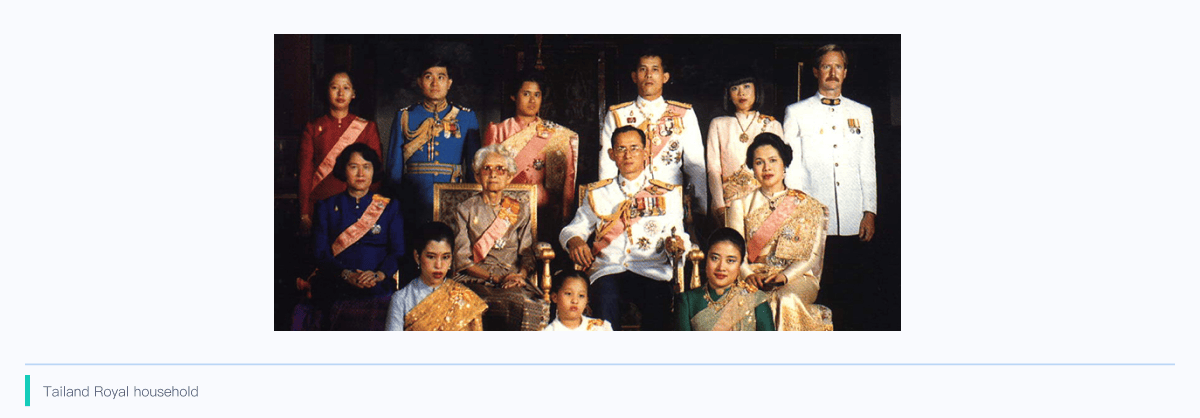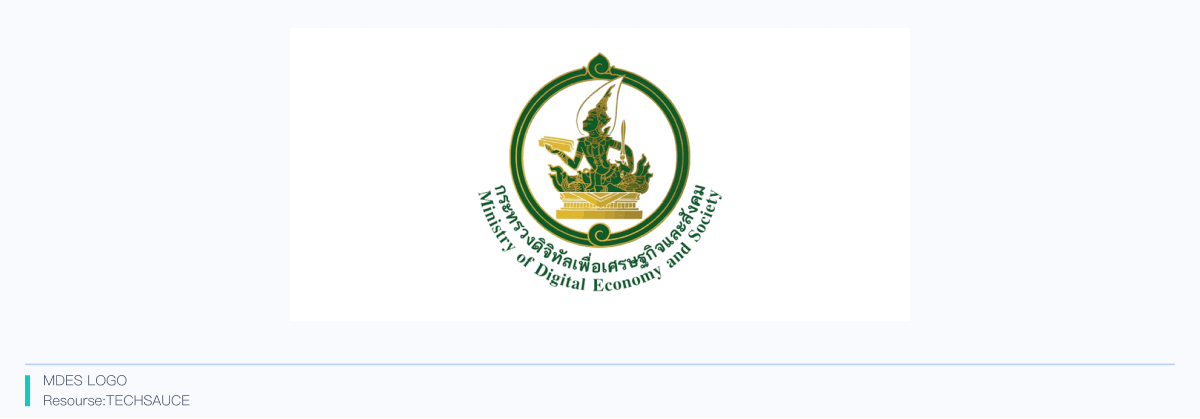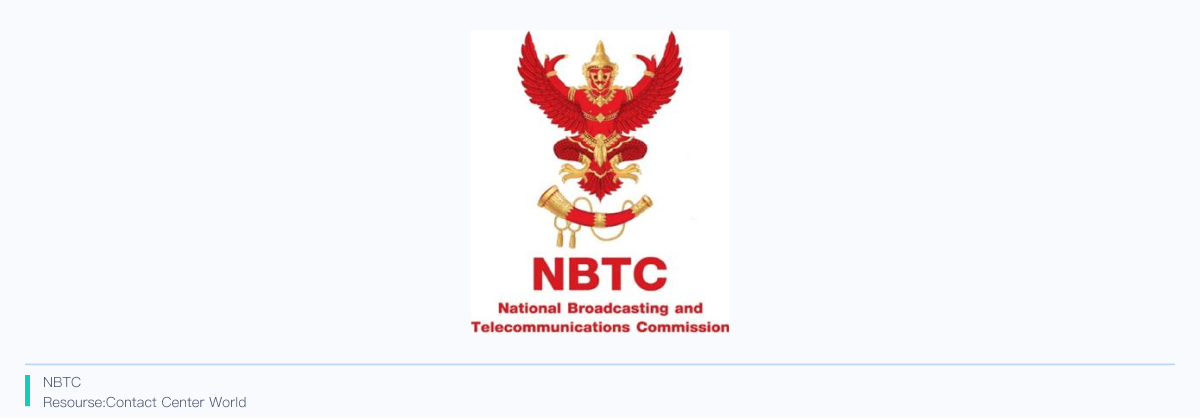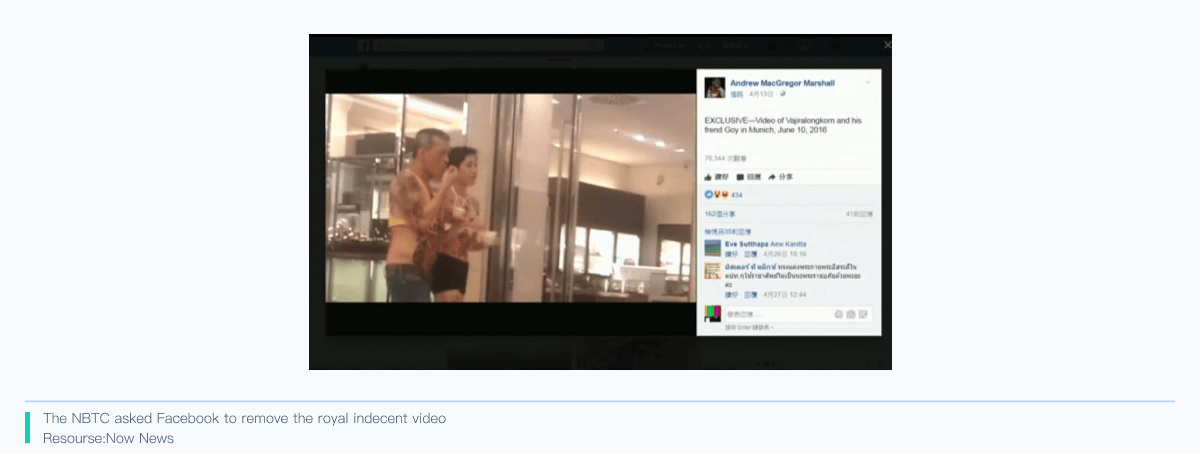Since the outbreak of the pandemic in 2020, Thailand has added 9 million new digital service subscribers, ranking second in Southeast Asia. It is predicted that Thailand's digital economy will reach $57 billion by 2025. With considerable new users and digital economy volume, Thailand has also become a popular country for domestic Internet companies to go to sea.
In Southeast Asia, Thailand's culture and politics have very distinct regional characteristics.
Thailand is a Buddhist country, with more than 90% of the population being Buddhists, and Buddhism has a profound impact on the daily life of the Thai people. In the political system, Thailand is a constitutional monarchy, the king and members of the royal family enjoy a high status in Thailand, by the Thai people love, anyone should not talk about the topic related to the royal family in public, or make comments that damage the reputation of the royal family, otherwise it is a felony.
In addition to the two strong social characteristics of Buddhism and the royal family, the Thai politics with frequent military coups has made the Thai society always in a state of unrest. Due to the dual influence of cultural and political situation, Thailand also presents a very unique regulatory style in Internet content censorship.

This article will focus on the compliance of Internet content in Thailand, and introduce how to carry out Internet regulation in Thailand from three aspects: regulatory history, regulatory institution setup and legislation.
Ⅰ. Historical Changes of Internet Regulation in Thailand
Thailand has been plagued by political instability since the end of absolute monarchy in 1932. After World War II, the military clique held the power for a long time, and the government changed frequently.
In the 21st century, Thailand experienced two major military coups in 2006 and 2014 respectively. Before the 2006 military coup, online content censorship in Thailand focused on pornography. Since then, due to frequent domestic unrest, Thailand's Internet censorship has also increased, and gradually turned to content related to lese majeste, national security, and political issues.
2007 is considered the first year of Internet content regulation in Thailand. In the same year, the parliament elected by the military coup quickly passed the Computer Crime Act, and Internet content censorship was formally enshrined in Thai law.
In 2014, another military coup took place in Thailand. Prime Minister Yingluck Shinawatra stepped down, and General Prayuth Chan-ocha, then commander-in-chief of the Royal Thai Army (RTA), established the National Council for Peace and Order (NCPO), becoming the supreme leader of Thailand's verdant ruling army. After that, Thai politics entered a relatively stable stage, and the Prayuth government also began a series of Internet regulation actions, such as the introduction of the amendment of the Computer Crime Law, and Thailand's Internet content entered the era of strong regulation.
According to statistics, in 2006, the proportion of banned content was: pornography 60%, property/contraband/prostitution 27%, lese majeste 11%, gambling 2%. By 2010, 77 percent of sites blocked were for lese majeste, while pornography dropped from 60 percent in 2006 to 22 percent. It can be seen that the change of regime has greatly influenced the content censorship in Thailand.
Ⅱ. Thailand's Internet Regulator
There are many Internet regulators in Thailand, and almost every government will set up a new regulatory department to further expand the government's regulatory authority and law enforcement over Internet content.
For the current government, the National Cyber Security Committee (NCSC), headed by the Prime Minister of Thailand, is the highest leading body in the Internet field, responsible for formulating national cybersecurity policies, action plans, and cybersecurity crisis prevention and control. Under the leadership of the NCSC, the Ministry of Digital Economy and Society, the Royal Thai Police, and the National Broadcasting and Telecommunications Commission have their respective roles, which together constitute the current Internet content regulation landscape in Thailand.
1.Ministry of Digital Economy and Society (MDES)
In September 2016, the Ministry of Digital Economy and Society (MDES) was established, replacing the former Ministry of Information and Communications Technology (MICT) to assume overall responsibility for policy development and regulatory enforcement related to the digital economy. One of the primary objectives of the new department is to bring innovative changes to the Thai satellite and digital industries to further advance the "Thailand 4.0 strategy".
MDES and its predecessor, MICT, have been censoring objectable content since their inception in 2002, but after the 2006 and 2014 coups, MICT began to have a greater say in censorship of online content, and the scope of law enforcement expanded from the initial censorship of websites to social media.

In November 2019, MDES established the "Anti-fake News Center", which is mainly used to verify the authenticity of online information and provide feedback to the public. The Anti-Fake News Center has about 30 staff members and focuses on reviewing online information in four areas: natural disasters, the economy, public health, and national policy and security. It is important to note that content that "disturbs the peaceful domestic order, violates morality, and harms national security" as well as news related to government policies are targeted by the center.

The center will use the resources of Thailand's state-owned telecommunications company to track suspicious messages, and use artificial intelligence and professionals to sift through online messages to ensure they can be verified within two hours. Once suspected fake news is found, it will coordinate with relevant departments to verify the information and release the results to the public through multiple channels. The Ministry of Digital Economy and Society, together with the National Police, has established a Police Cyber Task Force, to which verified false information is referred and sanctions are taken.
With the outbreak of the new coronavirus, false information and rumors on the Internet have become the focus of the Thai government in the past two years. Thai leaders such as Prime Minister, Deputy Prime Minister and Minister MDES have repeatedly ordered the rectification of online false information, and a series of administrative and legislative measures have been adopted [8]. In June 2021, a Thai district court ordered Facebook and ISPs to block or remove eight accounts for spreading false information.
The Royal Thai Police is the main law enforcement agency for Internet content regulation, responsible for combating illegal and criminal activities in the online world.
The Technology Crime Suppression Division (TCSD) was established in 2011 under the Central Bureau of Investigation of the Royal Thai Police. The department is responsible for censoring online content and dealing with cybercrime and lese majeste content. In 2019, the Tech Crime Division received more than 2,500 complaints, including 40 percent for defamation, 25 percent for online spam, 3 percent for commercial email fraud, 5 percent for trespassing, and 27 percent for other content.
In response to the increasing number of CyberCrime cases, in 2020, the Royal Thai Police established a new CyberCrime Investigation Bureau (CCIB) to take over the work of the Technology Crime Division, with a higher level of staff and increased from 30 to more than 300 people.
3.National Broadcasting and Telecommunications Commission (NBTC)
The National Broadcasting and Telecommunications Commission (NBTC) is Thailand's telecommunications and broadcasting industry regulator with direct regulatory authority over content in the radio and television industry. In 2021, for example, the NBTC requires digital TV live broadcast platforms to prohibit the broadcast of any content related to the reform of the monarchy, and violators will face fines, suspension, and revocation of licenses.

In terms of Internet content regulation, although NBTC does not directly participate in the regulation and law enforcement of Internet content, due to its close relationship with ISPs, the government will also use it to exert pressure on ISPs, requiring them to take the initiative to intercept undesirable network content.
In addition to the above three main regulatory agencies, other Thai government departments also conduct censorship and enforcement of Internet content within their respective areas of responsibility. In Thailand, for example, the Ministry of Justice set up a fake news center in 2021 to deal with online disinformation about the epidemic.
Ⅲ. Thailand's Internet Regulatory System
Legislation and administrative decrees are the two main means of Internet regulation by the Thai government. Legislation is relatively fixed, though updated from time to time, with the criminal code Lese majeste, the Computer Crimes Act, and the Gambling Act most frequently invoked in law enforcement. Administrative decrees are emergency solutions formulated by regulatory departments for a prominent network phenomenon and problem in daily law enforcement, mostly for social, political, historical and cultural topics on social platforms and websites. The introduction of administrative decrees often has a large uncertainty, often with a certain social characteristics of the topic, and the platform to remove the content. Below we will mainly introduce Thailand's Internet regulation legislation.
1.Thailand Penal Code, Section 112 (Thailand Penal Code, Section 112)
Offending the monarchy is a serious crime in Thailand. Article 112 of Thailand's Criminal Code states that anyone who defames, insults or threatens the king, queen, crown prince or regent can be sentenced to up to 15 years in prison.
Before the 2014 military coup, lese majeste was a relatively infrequent crime, with only five people sentenced to prison under the law. But within a year of the junta coming to power, that number had risen to 40, and the sentences were extremely harsh.
On August 7, 2015, a travel agent, Phongsak Sribunpeng, was convicted of Posting six disapproving comments about members of the royal family on Facebook. The original sentence of 60 years in prison - 10 years for each Facebook post - was later reduced when Sribunpeng pleaded guilty.
Hotel worker Sasiwimol Patomwongfa-ngarm was sentenced by a Chiang Mai military court to 56 years in prison for seven Facebook posts critical of the monarch, later reduced to 28 years after pleading guilty.
Thiansutham Suttijitseranee was sentenced to 25 years in prison by a Bangkok military court for Posting five comments critical of the monarchy on Facebook.
In addition to arresting people for making lese majeste comments, social media platforms have also become a focus of Thai regulators because of their powerful ability to spread.
In 2020, the Thai government warned Facebook of legal action for not taking down content deemed defamatory of the monarchy.
Thailand has shut down YouTube several times for distributing videos insulting the king.

In 2006, Thailand's military took over the country in a coup while Prime Minister Thaksin Shinawatra was traveling abroad. Since then, Mr. Thaksin's supporters and anti-junta forces have frequently used the Internet and radio to air criticism, spread propaganda and organize demonstrations. In a bid to consolidate power, the junta rushed through the Computer Crimes Act in 2007 to control online reactionary speech.
Since the implementation of the Act, Thai authorities have frequently invoked the relevant provisions to carry out arrests and block illegal Web pages. According to Reuters, between 2007 and 2009, Thai authorities blocked nearly 20,000 Web pages deemed insulting to the king. The most cited are articles 14, 15 and 16.
Article 14 of the Computer Crime Law stipulates that the dissemination of distorted or false information on the Internet harms the public interest, the dissemination of false information harms national security, public security, economic security, public infrastructure, and the dissemination of obscenity, endangering national security, violent terrorist content is an offence punishable by up to five years in prison, or a fine of up to 100,000 baht, or both.
Article 15 states that suppliers who are found to have knowingly provided support for such violations will also face the same criminal penalties.
Article 16 states that those who distribute, modify or edit another person's portrait on the Internet and cause damage to another person can face up to three years in prison or a fine of 200,000 baht.
Thailand is a country with a total ban on gambling, and the ban on gambling is one of the highest in the world. Thailand's Gambling Act 1935 prohibits all forms of gambling except state-issued lotteries and horse racing, and even playing cards in public places can be arrested by the police.
In recent years, Thailand has also begun to advocate the legalization of gambling, but it has not yet landed.
4.Data security and privacy protection legislation
Thailand's data security and privacy legislation is still in its infancy. In 2019, Thailand passed the Personal Data Protection Act, which is the unified act governing data protection in Thailand. Although the Personal Data Protection Act has long been passed, it will not be fully implemented until June 2022 for several reasons. As far as the protection of personal data is concerned, the Personal Data Protection Act sets out a number of principles, but specific measures need to be further defined.
In 2019, the Thai government also passed the Cyber Security Law to prevent and deal with cyber threats.
Ⅳ. Compliance Suggestions
The unique monarchical culture and the turbulent political situation have created a special pattern of Internet content regulation in Thailand. Overseas enterprises should set up the content audit focus of the platform from three aspects. First of all, considering the degree of respect for the royal family in Thailand and the enforcement of the crime of "lese majeste" by the Thai regulatory department, the platform should try to avoid content criticizing the Thai royal family, the use of royal names and portraits should be particularly careful, and even the discussion of the monarchy should be minimized.
Second, with the outbreak of the epidemic, the fight against fake news has become a key task of various regulatory departments in Thailand. The platform should actively respond to the law enforcement actions of MDES and the Royal Police, take the initiative to take measures against fake news on the platform, and avoid becoming a hotbed of fake news.
Third, combined with the control of online speech by Thai authorities in the process of government change in the past, we judge that in politically sensitive periods, regulators may strengthen the law enforcement of the Computer Crime Act, and increase the censorship of political speech on the Internet and content that threatens national security and disturbs social order. The platform should follow the changes in the political situation in real time and avoid becoming the dissemination center of political public opinion.





